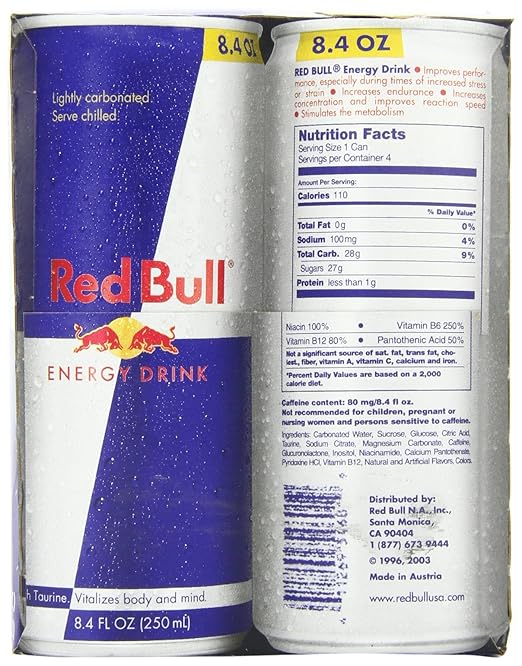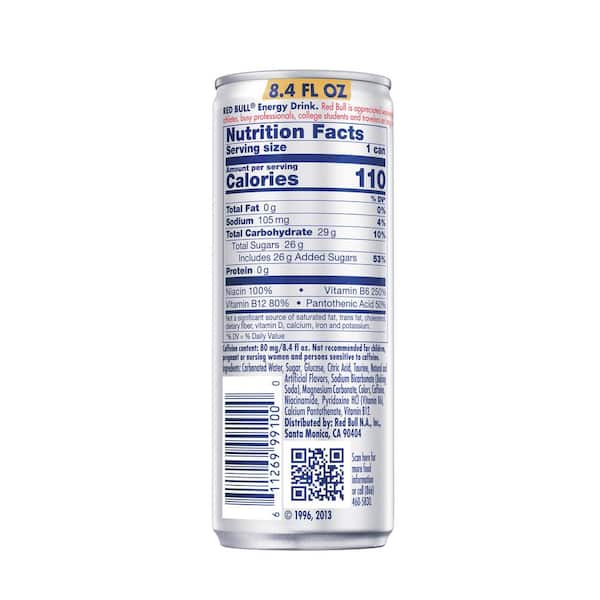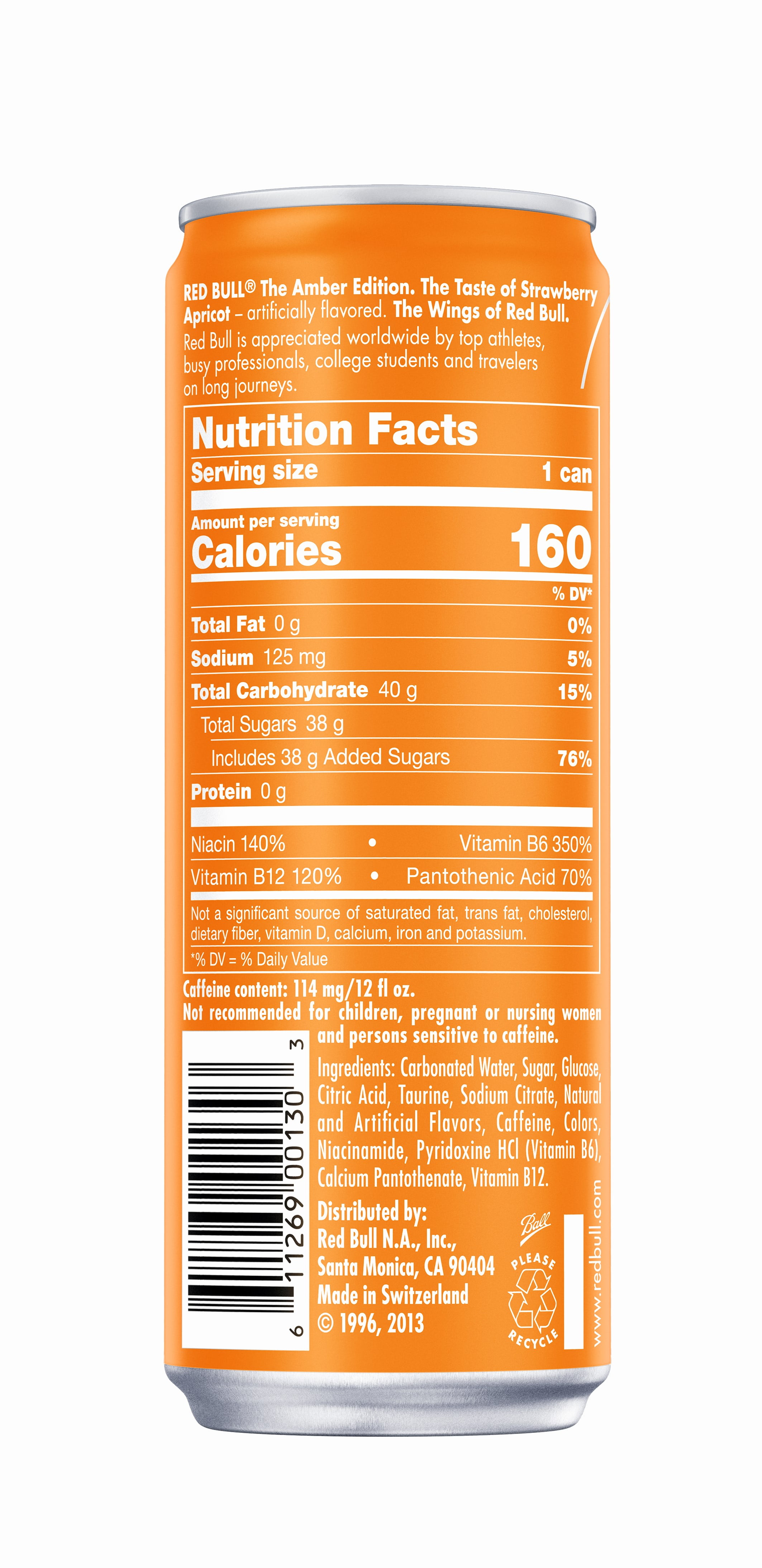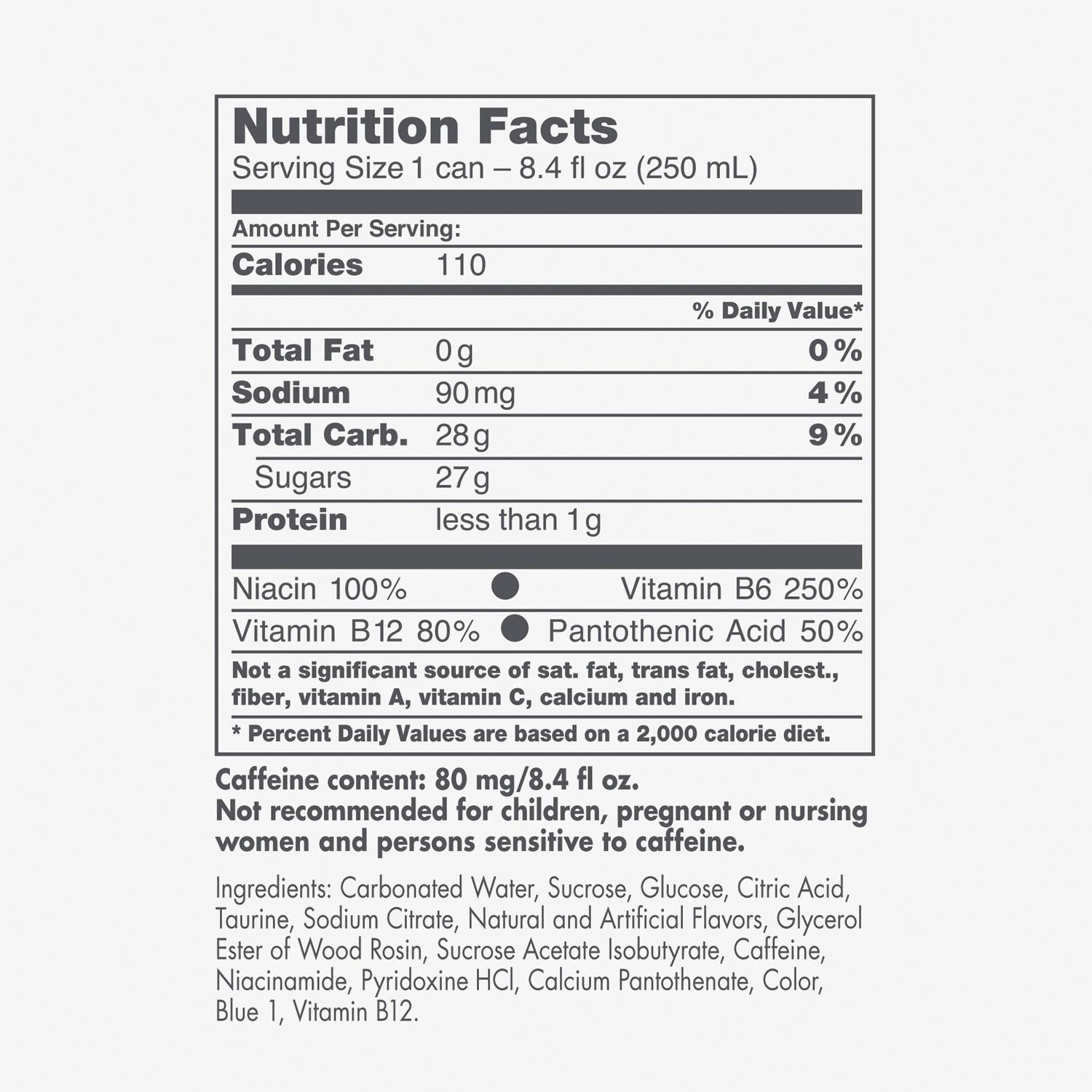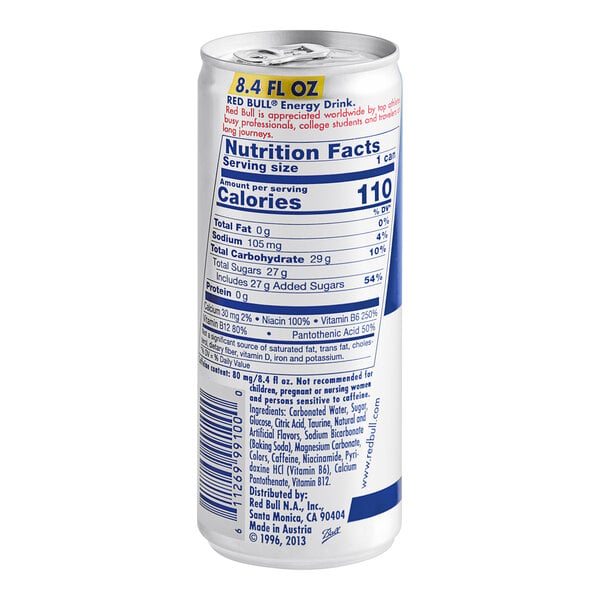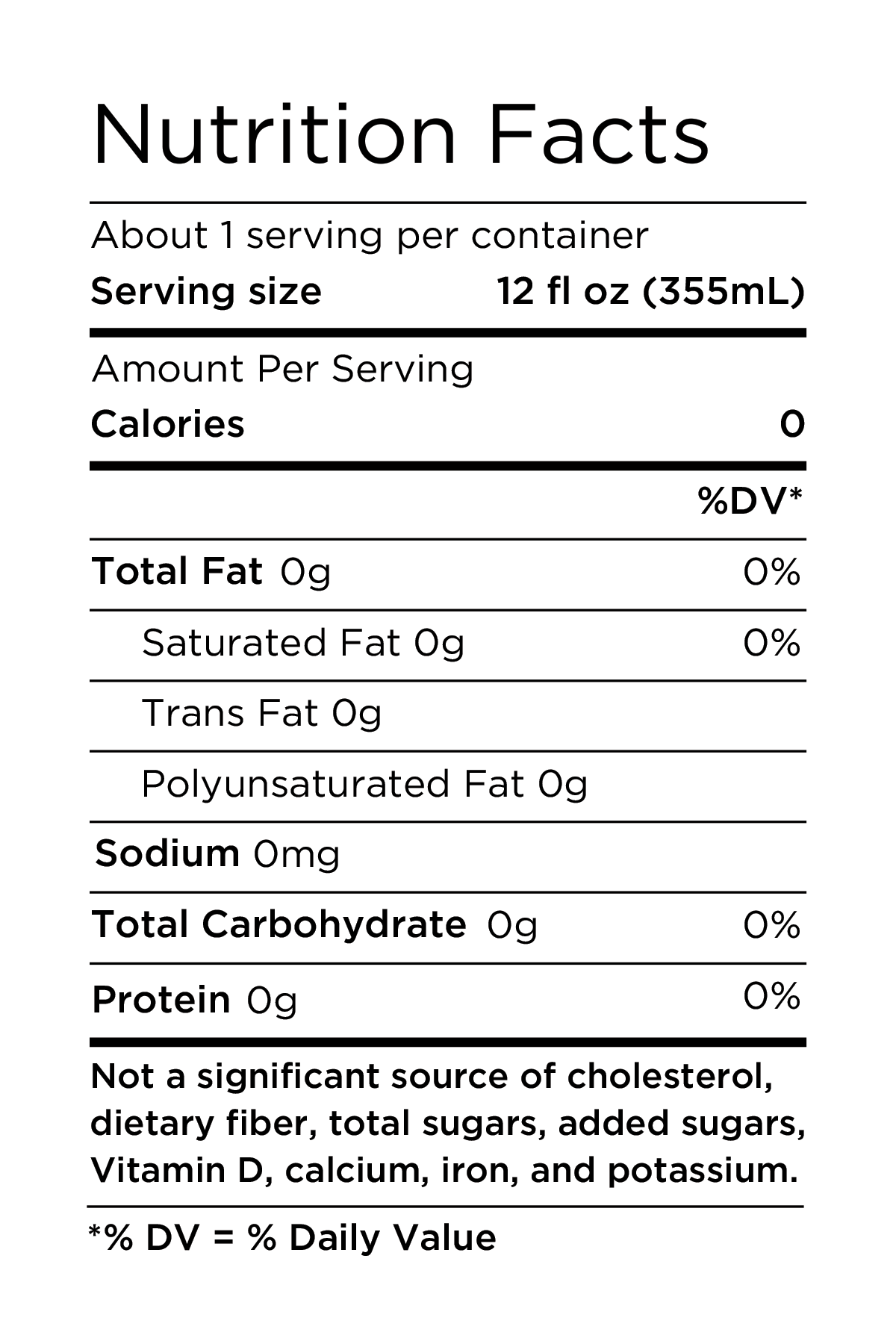Red Bull 12 Oz Nutrition Facts

Imagine the early morning sun peeking through the blinds, the aroma of freshly brewed coffee battling for dominance with the faint, sweet scent of... something else. It's the unmistakable tang of a chilled can, its silver and blue gleaming with anticipation. This isn’t just any beverage; it's a Red Bull, promising a lift, a boost, a surge to conquer the day.
This article delves into the nutritional composition of the ubiquitous 12 fl oz can of Red Bull, examining its ingredients and offering a balanced perspective on its role in our lives. We will dissect its components, exploring both the energizing benefits and the potential health implications, empowering you to make informed choices.
The Energy Drink Phenomenon: A Brief History
Red Bull, born from the Austrian ingenuity of Dietrich Mateschitz in the 1980s, wasn't just another soft drink; it was a lifestyle. Inspired by the Thai energy drink Krating Daeng, Mateschitz adapted the formula and branding for a Western audience.
The marketing strategy was revolutionary, targeting extreme sports enthusiasts, college students, and anyone seeking an extra edge. The slogan, "Red Bull Gives You Wings," became synonymous with the brand, embedding itself in popular culture.
The success of Red Bull paved the way for a plethora of energy drinks, transforming the beverage industry and redefining how we perceive and consume energy.
Unpacking the Can: Nutritional Breakdown
Let's crack open that metaphorical can and dissect its contents. According to the official Red Bull website, a 12 fl oz (355 ml) can contains:
- Calories: 160
- Total Carbohydrate: 39g (13% Daily Value)
- Total Sugars: 39g
- Caffeine: 114mg
- Niacin: 100% Daily Value
- Vitamin B6: 250% Daily Value
- Vitamin B12: 80% Daily Value
- Pantothenic Acid: 50% Daily Value
These numbers offer a concise overview, but understanding what each component contributes is crucial.
The Sugar Story
The high sugar content is perhaps the most scrutinized aspect of Red Bull's nutritional profile. 39 grams of sugar translates to roughly 9 teaspoons, exceeding the American Heart Association's recommended daily limit for women (6 teaspoons) and approaching the limit for men (9 teaspoons).
This surge of sugar provides a rapid energy boost, but it's often followed by a crash, leaving you feeling more tired than before. The long-term effects of consistently high sugar intake are well-documented, including weight gain, increased risk of type 2 diabetes, and heart disease.
Caffeine's Kick
The 114mg of caffeine in a 12 fl oz can of Red Bull is another key player in its energizing effects. This amount is comparable to a standard cup of coffee (around 95mg) but significantly less than some stronger coffee brews.
Caffeine stimulates the central nervous system, increasing alertness, reducing fatigue, and improving focus. However, excessive caffeine consumption can lead to anxiety, insomnia, and heart palpitations.
Vitamins: The Supporting Cast
Red Bull also contains several B vitamins, including niacin (B3), vitamin B6, vitamin B12, and pantothenic acid. These vitamins play vital roles in energy metabolism, helping the body convert food into usable energy.
While these vitamins are essential for overall health, it's important to note that Red Bull provides amounts exceeding the recommended daily value for some. While generally safe, excessive intake of certain B vitamins can lead to side effects in some individuals.
The Ingredients: A Closer Look
Beyond the numbers, understanding the individual ingredients provides a more complete picture. The core ingredients of Red Bull include:
- Carbonated Water
- Sucrose and Glucose (Sugars)
- Citric Acid
- Taurine
- Sodium Bicarbonate
- Magnesium Carbonate
- Caffeine
- Niacinamide (Vitamin B3)
- Calcium Pantothenate (Vitamin B5)
- Pyridoxine HCl (Vitamin B6)
- Vitamin B12
- Artificial Flavors and Colors
Taurine: The Mystery Ingredient
Taurine, an amino acid naturally occurring in the body, is often associated with Red Bull. Although some early studies linked taurine to improved athletic performance, the evidence remains inconclusive.
The amount of taurine in Red Bull is considered safe for most people, but its precise role in the drink's energizing effects is still debated.
Artificial Additives: A Word of Caution
Red Bull contains artificial flavors and colors, which some consumers may be concerned about. While regulatory agencies like the FDA have deemed these additives safe for consumption, some individuals may experience sensitivities or prefer to avoid them altogether.
The Debate: Benefits vs. Risks
The consumption of Red Bull, like any energy drink, comes with both potential benefits and risks. It can provide a temporary boost in energy and focus, which can be helpful in specific situations.
However, the high sugar and caffeine content can lead to adverse effects, especially when consumed in excess or by individuals with pre-existing health conditions. It's particularly important for children, adolescents, and pregnant women to avoid energy drinks due to the potential risks.
"Moderation is key," says Dr. Emily Carter, a registered dietitian. "If you choose to consume Red Bull, be mindful of the sugar and caffeine content and limit your intake. Consider healthier alternatives for sustained energy, such as balanced meals, adequate sleep, and regular exercise."
Making Informed Choices
Ultimately, the decision to consume Red Bull is a personal one. By understanding the nutritional facts and potential health implications, you can make an informed choice that aligns with your individual needs and goals.
Consider your overall lifestyle and dietary habits. Are you already consuming high amounts of sugar and caffeine from other sources? Are you prioritizing sleep, nutrition, and exercise? These factors play a significant role in your overall energy levels and well-being.
Explore alternatives. There are many healthier ways to boost your energy levels, such as drinking water, eating nutrient-rich foods, and engaging in physical activity. Natural sources of caffeine, like green tea, can provide a gentler and more sustained energy boost.
The Wings of Choice
The silver and blue can of Red Bull holds a complex concoction of energy and potential. It's a product of ingenuity and marketing prowess, embedded in our culture and offering a tempting promise of enhanced performance.
However, understanding its nutritional profile and potential health implications empowers us to make informed choices. It reminds us that true energy, the kind that sustains and nourishes, comes from within – from a balanced lifestyle and mindful decisions.
So, the next time you reach for that can, take a moment to reflect. Are you truly seeking wings, or simply a fleeting moment of artificial flight? The answer, ultimately, lies within you.

